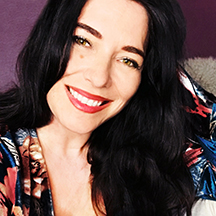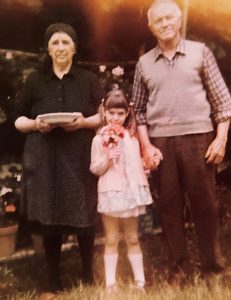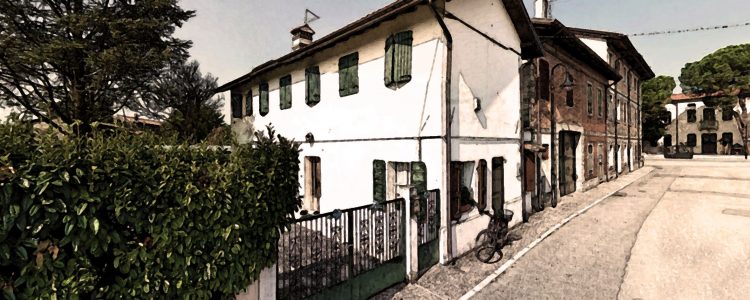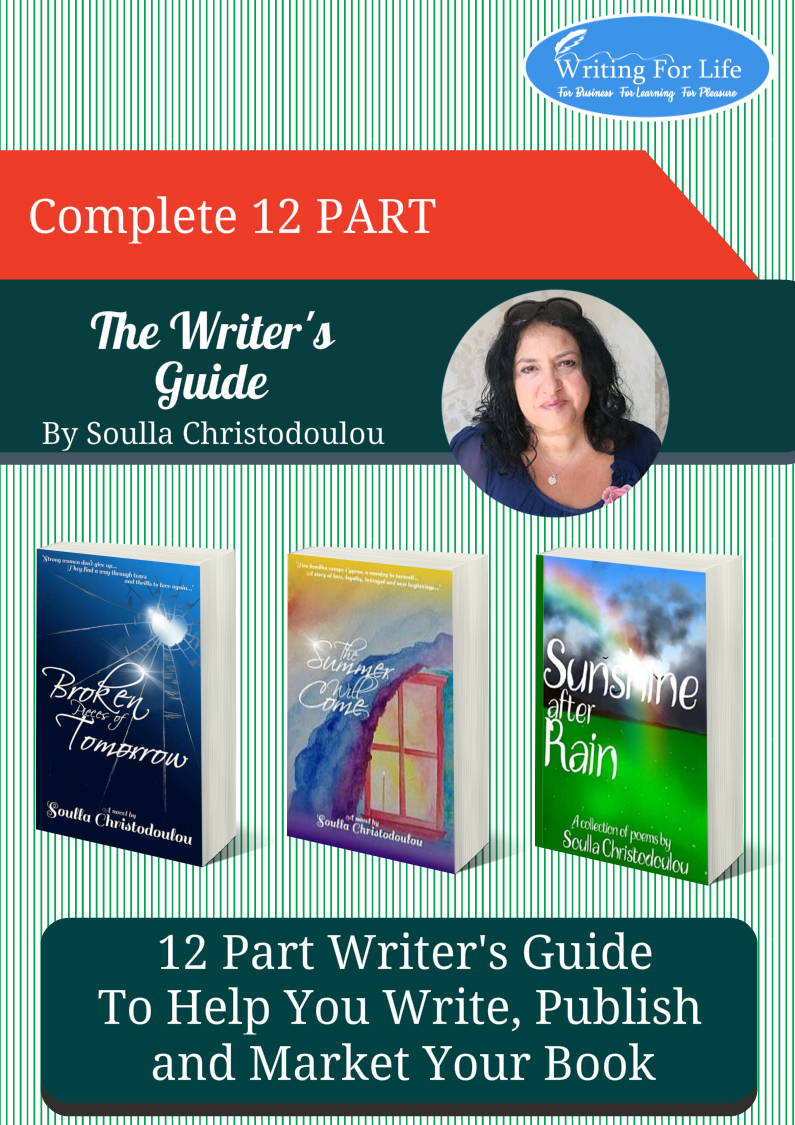Hello and welcome to A Cup of Conversation where I am joined by author Linda Ganzini who is sharing her journey and inspiration behind writing her book, Lilia. Linda explores the pain and trauma, hope and resilience around her mother’s, and mother’s family life, set against the during the German occupation in Italy and Italian genocide. She’s an absolutely beautiful soul and shares her own feelings about writing the book which is to be released soon. So grab your cuppa and join us for this wonderfully, moving A Cup of Conversation…you really don’t want to miss this.


1. When did you start writing creatively?
In high school, English was my favorite subject and where I first explored my creative writing skills. Through adulthood, I spent many years working in advertising agencies and smaller boutiques as a design director and at times would write copy for clients. I continue to do so from time to time, but what I derived the most joy from was writing lyrics. To me, music and words coming together is a powerful force that can soothe the soul. I’ve always been somewhat of a wordsmith, and I’m now stretching many new muscles as I write my first book. Growing through this journey has been the best experience. As challenging as writing can be, I am grateful every day for the opportunity to share this gripping story.
2. How do your passions in art, design and singing support your writing?
As a creative person, art has always been my purest form of self-expression, whether through the power of color, sound, or words. When I paint, I expand my ability to visualize and tell stories. When I sing, my soul is set free, and when I write, I get to walk in the shoes of my characters and bring them to life, or in the case of my book, Lilia, back to life. As a sensitive artist, I am closely tapped into my higher-self, and like most writers, when we channel that part of ourselves, is when the magic happens—our heart words appear on the page.
3. Please share a short extract from your book Lilia with us and tell us why you have selected this piece.
” At 6 am, gunfire cracked into the air drowning out the other sounds of dawn. A single bullet ripped into the children’s bedroom, and the noise reverberating above their heads beat upon their ears, throwing them into a fit of screams.
Everything around Maria felt like it was moving in slow motion as she barreled down the hallway.
“Get down! Get down on the floor!”
“Mama!” Lilia cried out. She had instinctively thrown her body over her three brothers, who trembled and whimpered beneath her.
Outside, one of Arturo’s closest friends, Pietro, had been walking next to his cow-trailed wagon, headed towards his family’s farm. As an only child, he was exempt from military service. The village square was lined with jeeps and surrounded by SS and Gestapo officers. They’d received the alert that partisans had been spotted in high numbers. Upon seeing the men up ahead, armed with machine guns, Pietro had panicked, abandoned his wagon, and bolted towards Maria’s house.
Maria heard the gate rattle open, and Germans shouting in the courtyard. More bullets fired overhead.
Maria’s shrill cries echoed as she flew down the stairs, her arms flailing madly. “Oh, dear God, help us!” She flung the front door open, gasping for air. Maria watched in horror as the SS dragged the young man through the soil of her garden by his feet. The saliva thickened in Maria’s throat as the soldiers beat the boy ruthlessly with the butt of their guns and kicked him repeatedly with their boots. Gore sprayed across his teeth and lips until he was virtually unrecognizable.
“Pietro!” Maria cried out to him. His hands clawed the earth in desperation, and his screams were choked by blood. His eyes pierced Maria’s heart, and she knew that she would never forget them.
“Maria! Say goodbye to my mama. Tell her I love her,” he managed to sputter out.
His wailing receded into a whimper as the Germans pulled him onto the street.
Maria sank to her knees as she watched the soldiers take her son’s friend away. Shutters inched open as neighbors craned to watch the chaos unfold before them. What had only been the terrain of nightmares was now a daily occurrence in this once safe and peaceful haven.
“Why did you run?” Maria’s weeping wouldn’t cease as she asked the single question over and over again. A silent scream inflated her body. It was for Pietro, for Arturo, for Erminio, for Virginio. For the tragic fate that had befallen so many innocent men and their families. “
**
There are numerous books written about war-torn families, but the story of Lilia is unique.
I chose this excerpt as it provides a window onto the struggles the Italian soldiers and civilians faced when Nazi Germany invaded their northern homeland toward the end of the war. Once allies with Germany, Italy became a target. Thousands of innocent Italian men, women, and children were taken for questioning and ultimately imprisoned in concentration camps.
After Benito Mussolini’s downfall in July 1943, over 15,000 Italians were killed between September 1943 and April 1945—the Nazis spared no one. This war was no longer a war between armies, but a genocide waged on civilians.
My uncle Arturo Meneguzzi was killed in a German concentration camp as were many other friends and relatives from my mother’s village. When I tell people about my uncle, they ask, “Are you Jewish?” Few people know about what happened in northern Italy. This story needs to be told.
4. What is your book about and what is the key message you would like your readers to take away with them after reading it?
This captivating saga unveils my mother’s remarkable and never-before-told true story. Love. Resilience. Legacy. These are the lessons my mother taught me in her struggles through poverty and the horrors of World War II. Lilia takes the reader on an inspiring journey through a brave girl’s unwavering courage and a family’s bond and struggle to survive. My book brings alive the characteristics of a quaint Northern Italian village while offering an eye-opening account of the little-known genocide suffered by Northern Italy during World War II.
This book will connect with those who believe in the strength of family and how it shapes our beliefs, attitudes, and ideals. My mother’s story exemplifies how, through the power of love, a family united can prevail over any obstacle and triumph over unimaginable hardships.
I know that Lilia will spark meaningful conversations about our untold life experiences and bring people together across generational and other differences. Cultural trauma continues to haunt us today, which is why stories like these matter—so they are never repeated, and history is never forgotten.
This book is being birthed at the right time, not only for cultural reasons but also in light of our present political climate. On a global scale, people are motivated by fear. We are afraid of our countrymen, fearful of immigration and our neighbors. My mother was a young girl coming of age during a time when the world feared its future. May her struggles propel readers into making peace with their childhood scars, rediscovering their voices, and living heroically and fearlessly. May my family’s story remind people of the genuine threat of history repeating. My hope is that through our shared stories, we can author a more peaceful legacy. By taking responsibility for each chapter, we can create a world free of hate, a world that is safe for our children. Lilia is my legacy, and my gift to humanity.
5. This must have been a tough story to write. How did writing such a personal story impact you emotionally, mentally, and physically?
Writing about my mother’s true-life story has been my biggest challenge and endeavor to date.
From the book’s inception, I found myself transforming into each of my characters, and in a sense, playing out their lives like an actor in a film, fully committed. I have been drained emotionally, mentally, and physically in the process—the roller-coaster ride has been on-going and will continue until I complete the manuscript. It’s unfathomable how much my family endured during the war, as each scene rips my heart open. I feel their fear, pain, emptiness, anger, and loss. Many nights I lay awake carving out the play-by-play of what I need to write the following day—this story never leaves me.
When I relive the lives of these brave souls and their struggles and strive to keep their spirit and memory alive, I’m writing through my tears.
Although this is an emotional journey, I can feel my ancestors channeling through me, their love and wind beneath my wings. There is comfort in knowing I’m not writing this book alone.
6. What has most surprised you about your family’s reaction to Lilia?
My mother comes from a family of 13. She is the eldest living sibling of her two brothers.
It took my mother until the age of 83 to release the memories of her harrowing past. Many of our family members were unaware of the tragic events that took place until now. I too was surprised.
The weekly excerpts that I share on social media are as heart-wrenching for my cousins to read as they are for me to write. Everyone is excited about my giving birth to this legacy for our family—the heroes who, apart from my mother, never lived long enough to tell their story.
7. What has been or will be the most challenging in preparing your novel for its release?
My manuscript is near completion, at which point, I have a handful of beta/arc readers lined up. Once my editor and I are satisfied with the final book, it will be ready for self-publishing. My hope is the release day will be before Mother’s Day. At present, I am querying literary agents. This process alone is an enormous amount of research and work—leave no stone unturned. I’m going to give up to the Universe how this book is delivered out into the world and trust the right plan will be laid. All I know is, one way or another, it’s happening!
8. In May 2018, you accepted an invitation to the 73rd anniversary of the “Flossenbürg.
Concentration Camp Liberation” in Germany. I imagine this was a tremendously emotionally draining trip. Can you share your memories of the trip with us?
I admit it was trepidation at first. Traveling to this remote village in the middle of the Bavarian forest alone filled me with uncertainty, and I debated canceling my trip. Never having met my uncle, I was repeatedly captivated by his photo feeling drawn and connected to his soul.
He never had a chance at life. Knowing how much he suffered, and the grief my grandparents and my mother endured, the desire to honor him triumphed over doubt. My willingness to pay respect to his memory and the countless others whose lives suffered an unimaginable, unjust fate, paved the way to an experience I will never forget.
Initially, I had conjured up all these dark images of the camp and how the energy might make me feel. The Flossenbürg memorial is somber, indeed, but the grounds are beautiful and serene which I was not expecting. Flowers line the pathways, and the open spaces are park-like.
Some might feel this is a way for the German people to mask the horrors that prevailed here, but I think maintaining the site with respect amidst all the darkness, creates a peaceful surrounding for people to reflect, pray, and pay their respects. Year after year, the compassionate facilitators at Flossenbürg strive to keep the memory of what transpired here alive, so this horrific period in history will continue to be shared and not forgotten. There were 600 people from 20 countries in attendance at the event. Rightly so, it was a huge turnout.
My tour guide took me through the arched passageway of the administrative building, once the SS headquarters. I looked around the vast open gravel space where thousands of prisoners were forced to line up for daily Appell (roll call). Prisoners were made to stand naked or with little clothing morning and evening until each person was accounted for and documented by the SS. They stood for hours, even in the dead of winter. If a prisoner disobeyed commands, they were punished by death. On any given day, the camp commander rode up on his horse and shot prisoners dead, proving his authority and frightening the prisoners into obedience. You were lucky to escape his selection.
I saw the kitchen to my left, where I learned my uncle worked while at the camp, and the laundry building was to my right. In the laundry basement are the original disinfection and shower rooms. If there was a presence felt on these grounds, I felt it here. What these poor souls endured, forced to strip naked with other prisoners not knowing what to expect, nor what chemicals were about to be showered on them.
On the upper levels, storyboards with audio were on display along with artifacts, and a large white book with the names of all those who perished. Leafing through the hundreds of pages in the book, I found my uncle’s name. “Arturo Meneguzzi, Prisoner Number: 38887— Born 24.11.1920—Died 6.3.1945” Running my fingers over his name, a deep wave of sadness washed through me, making his tragic demise undeniably real. I could almost hear Arturo whisper into my heart. “Thank you for coming. Thank you for remembering me.”
Each day at the camp was a humbling one. As I reflected on the lives of the prisoners, I redefined gratitude for my own. You can feel the needless suffering that took place here—the personal tragedies and photos are gut-wrenching. I was thankful to exit the building, see flowers, trees, green fields, and sunshine. Had it been a fierce German winter, this would have impacted me that much more — the senseless suffering.
The last night of the celebration, I attended a dinner for survivors, their families, organizers, volunteers, and honored political guests. It was there I met 92-year-old Jewish survivor Pepick. Speaking with Pepick and his family, I was amazed to discover he remembered my uncle. They had worked together in the camp kitchen.
Pepick shared with me how Arturo stole food to feed the other prisoners and did his best to keep up morale by singing to them in the barracks. Pepick began singing me the song. We quickly drew a crowd that evening, and our miraculous meeting touched hearts. In the history of the Flossenbürg memorial celebrations, this was the first connection of this kind to be made. Pepick and I embraced each other, both grateful for a moment neither of us will ever forget. If this doesn’t make you believe in fate, I don’t know what will.
At my last day in Flossenbürg, what shook and struck me most profoundly was the Crematorium and the Valley of Death. When the camp was liberated, a mound of ash was collected and interned into “The Pyramid of Ashes”—my uncle’s ashes lay there. Closing out the day, over one hundred people joined in a procession carrying flowered wreathes down the steep steps of the valley to The Square of Nations where tombstones memorialize the prisoners that died from each country.
The Flossenbürg memorial was extraordinary. I was overwhelmed by everyone’s openness, kindness, desire to give back, and willingness to help. I well up with tears when I think of their generosity towards me and each other. A camp once filled will horror and despair, was blessed with heroes of love and respect walking arm-in-arm.
This experience was a tremendous journey, filled with heart-wrenching discovery and immense gratitude, both expected and unexpected. I feel forever changed. I re-discovered the lesson, “Follow the calling of your heart, and it will take you where you need to go.” #NeverForget I will be returning to the 75th anniversary in spring 2020.
9. Which three aspects of the writing journey have you improved on since you first began your writing career?
I’ve become a much better editor, and I’m finding I enjoy the editing. I take pride in watching myself grow through these new stages of learning—one which I initially felt was overwhelmingly daunting. Over time I have learned to write more succinctly. I now try to eliminate unnecessary words as brevity can be powerful. When I look back at my earlier chapters, it’s satisfying to see how I’ve progressed—more showing, less telling. Through practice, I’ve learned to dive deeper into a character’s unconscious mind and paint a more vivid scene for my readers.
10. What advice would you give a new writer?
Write a tight outline. I learned the hard way by not following that advice. I was excited to begin telling my story and rushed through, what I feel to be a crucial part of the process. Also, if you can budget having a writing coach/editor onboard or join a writer’s group, I highly recommend you do. Writing is a solitary pursuit and can feel like a long-distance run at times—surround yourself with other writers for support. And don’t worry about how long it will take you to write a book. Mine is taking me over two years while I know authors who took five. You will give birth to your baby when the time is right. Lastly, write the book for you, from your heart, and don’t get wrapped up on what other people will think. Only you can write it. A kind soul recently imparted to me these words of wisdom: “How the first book is received is all but mute. That you put ideas and words into action…THAT is what speaks volumes.”
11. What two things do you do to support your fellow writing community?
I help promote their books through social media, and by showing up to their book signings and marketing/promotional events. And I encourage writers on their journey, on those days we all feel lost, wondering if we’re doing the right thing. No one said it would be easy. It takes a courageous heart to tell your story and put yourself out there for the world to see. It helps if we have each other.
12. What is your main goal for the rest of 2019?
I will have my manuscript completed by the end of November, and I hope to have my last edits competed before January in-time for my beta readers. And then, a spa weekend is in order—with my mama!
Aww, I absolutely loved this interview with you Linda and the answer to that last question, is the only answer, right? Thank you for joining us and I wish you all the best as you release this amazing story into the world!
To my readers, thank you for joining us and if you would like to link up with Linda you can do so on her links listed below.
Until next week, Happy Reading, Happy Writing, Happy You.
Big hug, Soulla xxx
Links:
Twitter: https://twitter.com/LindaGanzini
Instagram: https://www.instagram.com/lindaganzini/
Facebook: https://www.facebook.com/lindaganziniwriter/
LinkedIn: https://www.linkedin.com/in/ganzini/
Website: https://www.lindaganziniwriter.com


